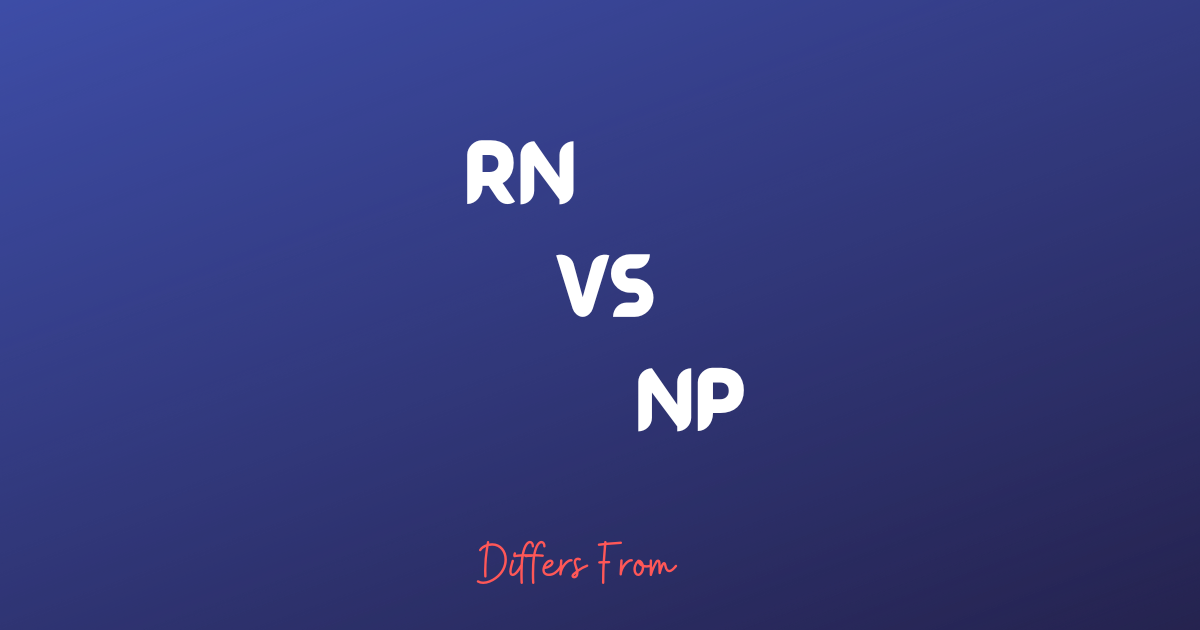The healthcare industry offers a wide range of career opportunities, with two of the most vital roles being the Registered Nurse (RN) and the Nurse Practitioner (NP). While both RNs and NPs play crucial roles in patient care, they have significant differences in terms of education, responsibilities, and autonomy. Understanding these differences is essential for anyone considering a nursing career or simply navigating the healthcare system.
Key Difference between a RN and NP
| Aspect | Registered Nurse (RN) | Nurse Practitioner (NP) |
| Education | Associate/Bachelor’s degree in Nursing | Master’s/Doctorate in Nursing |
| Scope of Practice | Implements care plans, assists doctors | Can diagnose, treat, and prescribe medications |
| Job Responsibilities | Patient care, administering medication | Advanced clinical care, diagnosing illnesses |
| Autonomy | Works under the supervision of physicians | Can work independently in most states |
| Salary | $75,000/year (average) | $110,000/year (average) |
| Work Environment | Hospitals, clinics, nursing homes | Private practices, hospitals, specialty clinics |
What is a Registered Nurse (RN)?
A Registered Nurse (RN) is a healthcare professional responsible for providing direct care to patients, administering medications, and supporting doctors in various medical procedures. RNs are typically the first point of contact in a hospital setting and play a vital role in ensuring patient safety and well-being.
Education and Certification:
To become an RN, one must complete an accredited nursing program, either at the associate or bachelor’s level. After graduation, passing the NCLEX-RN exam is mandatory to obtain a nursing license.
Responsibilities:
- Administering medications
- Monitoring patient health and recording observations
- Assisting with diagnostic tests and medical procedures
- Educating patients about health management
Workplaces:
RNs work in diverse settings, including hospitals, nursing homes, outpatient clinics, and even schools.
What is a Nurse Practitioner (NP)?
Nurse Practitioners (NPs) are advanced practice nurses who have obtained a master’s or doctorate in nursing. NPs have the authority to diagnose illnesses, prescribe medications, and provide advanced clinical care, often independently from physicians.
Education and Certification:
To become an NP, one must first be an RN and then pursue a Master’s or Doctorate in Nursing. NPs also need to pass a national certification exam specific to their specialty area.
Responsibilities:
- Conducting physical exams and diagnosing health conditions
- Ordering and interpreting diagnostic tests
- Developing treatment plans and prescribing medications
- Providing counseling on preventive care
Workplaces:
NPs often work in private practices, specialized clinics, and hospitals, and many have their own practices in states that grant full autonomy.
Key Differences Explained in Detail:
Education:
RNs typically earn an associate or bachelor’s degree in nursing, while NPs must complete a master’s or doctorate program. This advanced education allows NPs to take on more responsibility in patient care.
Scope of Practice:
The scope of practice for RNs is more limited, as they typically implement care plans created by doctors and assist in patient management. NPs, on the other hand, can diagnose and treat illnesses on their own, often serving as primary care providers.
Autonomy:
One of the most significant differences is autonomy. While RNs work under the supervision of physicians, NPs have the authority to work independently in many states, diagnosing and treating patients without a doctor’s oversight.
Salary:
The salary difference reflects the varying levels of responsibility. According to the Bureau of Labor Statistics, RNs earn an average of $75,000 per year, while NPs earn about $110,000 annually.
Why Choose One Over the Other?
Choosing between becoming an RN or NP depends on your career goals. If you’re looking for advanced clinical responsibilities and greater autonomy, becoming an NP could be the right path. If you prefer providing hands-on care and working as part of a larger medical team, the RN role might be more suitable.
Common Misconceptions:
- RNs can prescribe medications: In most states, RNs cannot prescribe medications, unlike NPs who have this authority.
- NPs only work in hospitals: NPs often work in clinics, private practices, and community health settings, providing primary care.
Resources:
- For more details about nursing roles, visit the American Nurses Association.
- Learn more about the differences in scope of practice between RNs and NPs on the Bureau of Labor Statistics website.
Recommended YouTube Video:
Conclusion:
Both RNs and NPs play essential roles in healthcare. While their responsibilities overlap in some areas, NPs have advanced education and greater autonomy in clinical settings. Whether you choose to become an RN or NP, both careers offer the chance to make a significant impact on patient care.

